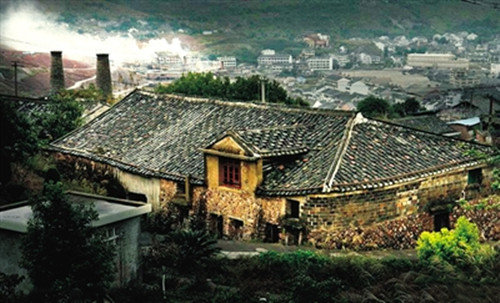 |
|
The former residence of the Zhu family is now a museum in which a variety of porcelain wares are on display.[www.baidu.com]
|
A Glorious Era
Sitting on a slope by a river, Wanyao Village boasts amazing scenery. Homes, workshops, water-powered trip hammers, dragon kilns (long, cave-like kilns) and old opera stages on the mountainside tell centuries-old stories.
Flagstone roads honed for hundreds of years lead to every corner of the village. A brook flows through the village, providing the locals with water for laundry, cooking and bathing. Scores of wooden waterwheels run as they did in the past.
More than 300 ancient wooden houses still inhabited by villagers today stand in the mountain valley. A typical complex is made up of one main house that faces south, two wings and a courtyard. Built as such on mountain slopes, wing rooms are often octagon-shaped or in stilted buildings that have three or four floors. The houses showcase age-old wisdom and techniques in construction in line with the local conditions, and integrate subtly and simply in the natural surroundings, and are deemed rare living fossils.
It is said that during the golden age of the Ming and Qing dynasties, it was considered highly desirable to marry someone from Wanyao Village and settle down there. Evidence of how prosperous and abundant the village used to be can be seen on the hillside where an ancient opera stage stands. Such a gorgeous opera stage in a quiet, isolated world is an unbelievable sight.
It is a wooden construction with neither nail, nor any other metal component. Stories of classical operas are exquisitely painted on the spiraling roof. All the characters have vivid facial expressions and colorful costumes. Despite the battering from wind and rain over the centuries, the fine brushwork is still clear. The dancers, musical instruments, performers and the applauding audience come to life. The animal statues lining the roof edges are similarly impressive.
Locals told me that the stage was built in the village’s heyday when merchants from all over the country flocked to purchase porcelain. The handicraft of porcelain making often took a long time, so merchants would sometimes stay in the village for several months at a time so as to stockpile goods. In a shrewd business move, smart villagers raised funds to build stages and invite opera troupes to perform. In this way, merchants could enjoy and relax while conducting trade – and happy customers were bound to spend more and come back thanks to the hospitality of the locals.
In addition to the stage on the hillside, there was another stage at the foot of the mountain, which was removed when the reservoir was built. In the old days, famous opera troupes from Wenzhou often took turns to perform on these two stages. Stories of historical legends and romantic affairs played out, attracting large crowds. The box office records of Wanyao Village even surpassed that of Wenzhou. The village, consequently, enjoyed great fame for its cultural atmosphere.
We Recommend:
